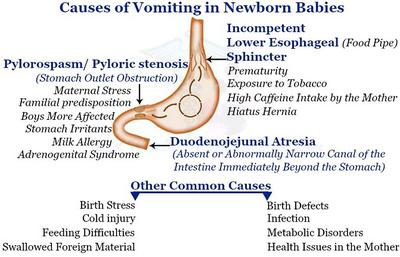Causes of Vomiting in Newborn Babies
by Prasant
(Kathmandu, Nepal)
My 2 days old newborn boy has been vomiting since birth. He vomited soon after he was born, and every feed thereafter. The continuous vomiting has caused his transfer to neonatal intensive care.
His stomach has been washed several times, but he is still vomiting. The reports, of the blood tests and X-ray done, show no abnormality. I really have no idea what is happening and what to do!
Doc, I want to know what way my son can recover. He was born of normal delivery with birth weight of 3.5 kg.
The Expert, Ren Chats Answers
Most babies vomit a few times during the first 48 hours of birth. Sometimes it is just a transient effect of the adjustments a baby undergoes to establish his independent survival. But surely, it can also be the most initial sign of an underlying serious disorder, and I do understand your anxiety.
Nevertheless, in most cases, a complete clinical picture of baby’s medical history, is of prime importance in assessing the significance of vomiting. This includes baby’s health before, during and after birth, maturity at birth, and feeding practice. Age and birth weight you have mentioned.
Effect of birth process
The most common cause for “vomiting in newborn” is the stress during child birth, which sometimes goes undocumented and the search for the cause continues. Passage through the birth canal is known to be the most dangerous journey of one’s life.
All babies undergo frequent short periods of oxygen deprivation throughout the birth process. This is because, with each maternal contraction, that helps them come out, their blood vessels also get squeezed. Besides, the pressure changes in the narrow birth canal cause corresponding pressure fluctuations in babies’ skull and thus in the brain.
However, most babies bounce back to health. Only about 6 in 1000 full term newborns suffer diagnosable ill effects. 60% of the newborns in whom vomiting is due to birth stress, typically show excessive mucus in their vomitus.
Health of the mother
Unhealthy womb environment could cause health issues in the baby. For example, infants of diabetic mother are not only prone to poor oxygen supply, but also to a variety of birth defects.
Caffeine dependence
Studies show that as little as 2 cups of coffee per day can cause contraction of placental blood vessels and significantly restrict oxygen supply to the baby.
Moreover, in older children, excessive intake of caffeine containing foods and drinks, like chocolates, tea, and beverages is known to cause relaxation of the lower esophageal sphincter, and thereby poor closure of the lower esophageal sphincter (see the illustration given above). Consequently, the contents of the stomach find a free passage back into the food pipe and up to the mouth. This regurgitation in the newborns could be easily mistaken for vomiting episodes.
The harmful effects of caffeine on fetus are further aggravated in presence of concomitant nicotine effect. Infants of the mothers who indulge in tobacco intake or are exposed to secondhand smoke have increased tendency to bring up.
Swallowed foreign material in the stomach stimulates vomiting
During the birth process, baby often swallows maternal secretions, amniotic fluid (the water that surrounds the baby in the womb), or leaked out meconium. All these are irritant to the delicate inner lining of the stomach, which leads to increased tendency to vomit.
Cold injury
Neonates at birth are prone to loose body heat. They are drenched in the amniotic fluid, and their body surface area is large. Moreover their body temperature at birth is about 37 degree centigrade, which is significantly higher than that of the environment into which they are born. Thus a newborn not only loses a lot of body heat due to evaporation from the naked wet body, but also to the surroundings. In some, the body heat loss may be so quick and severe that it results in instability of the normal body functions.
Gastric outlet obstruction - pylorospasm and pyloric stenosis
Excess mucus in the stomach
At birth, many babies have the tendency to vomit. Their vomitus often contains a large quantity of mucus. Excess mucus is believed to be a sign functional abnormality of the stomach. What exactly triggers off the excessive secretion by stomach mucosa is not known.
The newborns, who have excessive mucus secretion, are unwilling to take feeds, and if fed forcefully, they bring it all up along with a lot of mucus. They vomit repeatedly until the excess mucus in their stomach cleared, and the production of the new has ceased.
Frequent stomach wash helps clear the stomach, dispel appetite loss and stop vomiting in these babies. Stomach wash also helps to calm down vomiting tendency in cases of gastric outlet obstruction, like pylorospasm.
Other common causes:
1. Uncomplicated Prematurity – Baby is just not ready for the feeds
2. Feeding difficulties
3. Infections
4. Intracranial lesions
5. Developmental abnormalities
6. Metabolic disorders
Liked what you read just now? Pay it forward!










